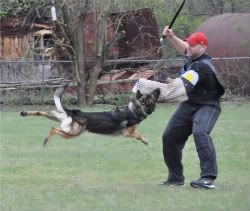 Puppy temperament testing criteria.
#344238 - 09/13/2011 05:02 AM Puppy temperament testing criteria.
#344238 - 09/13/2011 05:02 AM |
Webboard User

 
Reg: 05-25-2011
Posts: 439
Loc: Lawton, OK
 Offline Offline |
|
I've always been curious as to what exactly is the criteria that goes behind determining the temperament of a puppy? Does the temperament test remain the same for all breeds? How do you tell what a puppy will grow to be like? What observations need to be made , and how is the test performed?
I'd really like to hear from different people what their take on that is. What makes a good pet? What makes a good guard dog? What makes a good sport dog? What makes a good PPD? (as far as the testing goes)
Just thought I'd ask. I've always been curious, and couldn't find a good thread on it where it had been discussed already.
Cassy & Leo enjoying a nap.
 |
 Top Top
|
 Re: Puppy temperament testing criteria.
[Re: Ben McDonald ]
#344245 - 09/13/2011 09:18 AM Re: Puppy temperament testing criteria.
[Re: Ben McDonald ]
#344245 - 09/13/2011 09:18 AM |
Webboard User

   
Reg: 04-19-2009
Posts: 1797
Loc:
 Offline Offline |
|
The quiet one sitting in the background is full from having the prime spot on mom and exhausted from taking a round out of his littermates.
The one up front, trying desperately to get to you, is afraid the one in the back is going to re-energize soon and take another round out of him.
The ones in the middle are assessing you for targeted bite spots and the push over factor.
As you can tell, I have absolutely no clue what I’m talking about. 
I just get them as they come, provide the environment and training I think they’ll be successful at and enjoy the quirks and learning process along the way.
|
 Top Top
|
 Re: Puppy temperament testing criteria.
[Re: Ben McDonald ]
#344246 - 09/13/2011 09:29 AM Re: Puppy temperament testing criteria.
[Re: Ben McDonald ]
#344246 - 09/13/2011 09:29 AM |
Webboard User

  
Reg: 10-09-2008
Posts: 1917
Loc: St. Louis, Missouri
 Offline Offline |
|
http://workingdogs.com/testing_volhard.htm
The Volhard puppy aptitude test is one that I'm familiar with. The link above describes the criteria used for testing, what temperament trait each test is evaluating, and what the scores "mean."
Some breeders use this test--others can simply evaluate their pups based on the close observation they give them every day and don't do any formal "test." They know which pups are the confident ones, which are the shy ones, etc.
I think these kind of skills/temperament tests are pretty useful. They really do give you a glimpse at basic things like whether a puppy is human-focused, how reactive they are to environmental stimulii, how readily they submit, etc.
My dogs are all pets--so I'm looking for puppies that are clearly interested in interacting with me and willing to submit to handling. I also prefer puppies with some confidence and curiosity (a shy pup would be overwhelmed in my houseful.)
When I adopted my most recent pup from the shelter, I spent a half hour or so in a quiet room with him alone, doing some of these tests.
I held him off the ground to see how long he'd squirm, and if he'd settle. (he did)
I turned him on his back and held him like a baby to see if he would permit it. (he did, after a protest)
I played with his toes, and pinched the web. (no reaction)
I dropped a folding chair to make a loud noise to see how he'd react. (he went to the chair to explore it)
I turned by back to him to ignore him. (he came over and tried to engage with me and get my attention)
I brought treats and a soft toy to see what his interest was. (he was very interested in both--I tossed the toy across the room, he chased it)
All these things gave me a sense that this was a puppy I could work with---he was interested in me and the things I had, he wasn't easily rattled, but was willing to submit to leadership.
A puppy that wasn't all that interested in me (who prefered to sniff the edges of the room rather than engage with me)--or who was too shy/overwhelmed by the new experience to engage would be signs that this wasn't a pup that was ideal for my household. But in another situation those might be exactly what someone is looking for---a puppy that is going to grow up to guard a flock of sheep or a car lot should be one that doesn't desperately need human interaction. A lap dog for an elderly person shouldn't be one that's overly stimulated by his environment. A household with toddlers or cats would be better off with a pup that doesn't care about chasing things.
I'm sure others can comment better than I about the kinds of puppy traits one looks for in a sport/PPD dog.
Cinco | Jack | Fanny | Ellie | Chip | Deacon |
 Top Top
|
 Re: Puppy temperament testing criteria.
[Re: Tracy Collins ]
#344250 - 09/13/2011 12:16 PM Re: Puppy temperament testing criteria.
[Re: Tracy Collins ]
#344250 - 09/13/2011 12:16 PM |
Webboard User

Reg: 07-17-2010
Posts: 1442
Loc: UK
 Offline Offline |
|
I can only speak from the pet/companion perspective, the Boxer rehomer we had as a youngster was a handful all his life, bouncy and protective, tenacious and stubborn, whereas the female, at 8 weeks,(and the runt), was cautious in the whelping box but a total honey and a very outgoing and confident adult, our pointer male was a busy pup, but very sweet and sociable, the female was I swear born running and scatty, at 7 she shows no sign of slowing down, the first Boerboel, the female, was a complete shark and would NOT give it a rest, but is now, at 2 and 9 months, the most biddable and affectionate girl, dependable and sound, her litter brother Kaiser was about as lazy as they come, a fool and a horses arse but my very best friend, devoted to me and a Mummy's boy, our third boerboel, Harry was a calm, happy and adorable pup, who unbeknown to us was a ticking time bomb of a rogue gene who at 8 weeks was confident, assured and seemingly well balanced, the most amiable of the litter, but who was doomed to an early death as the fault in the line manifested.
I guess what I am trying to say is, and I imagine some may disagree, not all pups stay the way they present at the 8 - 12 week stage, and having had 3 very different breeds over a 30 year period, to condense it, the English Pointers were, and still are pretty predictable, bomb proof with kids and have been on the whole a breeze, hard to wear out though, the Boxers were amazing family dogs, happy, but needed a ton of obedience training and discipline all their lives, and the Boerboels, while still a work in progress, are showing their guarding abilities around the property, though I personally don't think they would be a candidate for PPD's, though because of their sheer size, they are a deterrent to your average chancer, however, and only in my experience, they need stacks of socialization to be around kids, ten stone of 2 year old, (and still growing) has to be taught early on about boundaries, children need the same instruction.
I was always told that you should let your pup choose you, but I think it helps to know what you want from the start, trust your (carefully researched!) breeder to advise you as to the best match for your situation, and where possible get the pedigree/line the pups come from, going back beyond the parents, and ask lots of questions of knowledgable people.
I had to turn everything I thought I knew about pups on its head with each successive breed, do your homework, but be prepared for the occasional sidewinder that unfortunately can come your way if you don't have the full picture on the line the pup comes from.
The pairings for the pointers and the boerboels were selected for temperament, had lots of desentizing to sights and sounds before going to their new homes, the Boxers, I am sorry to say were not, and at the end of it all you pretty much have to choose carefully with as much information as you can garner, but be ready for any eventuality and commit to always doing the right thing for the dog, I know I over estimated my ability with the whole Harry situation, and I have to live with the consequences of that every day.
|
 Top Top
|
 Re: Puppy temperament testing criteria.
[Re: tracey holden ]
#344253 - 09/13/2011 12:38 PM Re: Puppy temperament testing criteria.
[Re: tracey holden ]
#344253 - 09/13/2011 12:38 PM |
Webboard User
  
Reg: 01-14-2008
Posts: 213
Loc:
 Offline Offline |
|
The tests like the Volhard are a good way to get a pretty complete snapshot in time, but they really are just that, a snapshot. They don't take into account what has happened before the test, not just in the hours before but the days and weeks. But if you only have a limited amount of time to assess a litter, it's a good way to make sure you covered all your bases and didn't forget to test for something.
At the same time, a good breeder shouldn't have pups going through a test like that and have any surprises, not if they have been interacting with their pups. They should know who is bold, who is shy, who is dominant, who is submissive, and not just at this exact moment in time, but who is consistently showing those traits.
The one thing I don't like about tests like the Volhard is that they are based in a large part on "untouched" dogs. Meaning for a mild noise sensitivity issue to show up on the Volhard test, the puppy would need to be with a breeder who either didn't recognize the issue earlier on, or who recognized it and did nothing about it, so the test would be as "genetically accurate" as possible. And frankly as a breeder if I see a pup at 3 or 4 weeks who is showing a little more of a startle response to noise than it's littermates, I'm not going to wait until 7 weeks and some formal test is done before I start working with that pup. I'll make note of it, then start working with it. Not to mention the toys I put in my puppies pen make all sorts of noises, some which mimic the noise on the test, not because I'm trying to raise puppies to 'beat' the test, but because this is how I raise pups. So by testing age, they already associate pennies in a can, or rocks in a bottle, as fun toys to play with, not as curious startling noises to react to for a test. Another example, the flipping on the back test. I routinely handle my pups from day one, holding them on their backs in my lap or arms while I handle their feet, look at their teeth, rub their bellies, etc. So now testing day comes along. A pup with an extreme reaction to being held on it's back is still going to react, but a pup with a more moderate natural reaction may not react at all because of how I have raised it. Once again I've created flaws in the test with my puppy raising style.
And as someone else mentioned, what you see at 8 weeks is a decent predictor of adult personality, but it's not an absolute. You really have to know the breed and the lines. I've seen pups at 8 weeks who were rock solid, forward, confident pups who as adults weren't. And I've seen pups at 8 weeks who frankly I would have classified as "sh!tters", fearful of people, noises, etc who as adults look like solid, confident dogs. Some of it is the bloodlines, and knowing weird stages they go through, and a lot of it is how the dog is raised. There is more than one dog out there competing at the national level and higher who I met as a pup and thought "no way I'd keep that", but as adults are out there kicking butt.
|
 Top Top
|
 Re: Puppy temperament testing criteria.
[Re: Kadi_Thingvall ]
#344257 - 09/13/2011 02:16 PM Re: Puppy temperament testing criteria.
[Re: Kadi_Thingvall ]
#344257 - 09/13/2011 02:16 PM |
Webboard User
   
Reg: 03-01-2005
Posts: 1132
Loc:
 Offline Offline |
|
I agree with Kadi. While I tend to do the Volhard test just for the heck of it, if the litter is yours you should know the pups from observing them day in and day out. My pups turned 3 weeks today and already you can see the temperamental differences in some of the puppies. It is fascinating to watch!
Interestingly enough, I was speaking with Michael Ellis about puppy selection/evaluation this summer and he remarked that he does not use Volhard type testing because he believes that it is labeling puppy, sometimes incorrectly, and could affect how its future owner deals with it. Michael remarked that he bases more on matching the puppy temperament with the owner best suited to bring out the best in that specific puppy.
Along that lines, I found this to be an interesting article:
http://www.spritebelgians.com/philos/art4.shtml
|
 Top Top
|
 Re: Puppy temperament testing criteria.
[Re: Ingrid Rosenquist ]
#344258 - 09/13/2011 02:31 PM Re: Puppy temperament testing criteria.
[Re: Ingrid Rosenquist ]
#344258 - 09/13/2011 02:31 PM |
Webboard User

  
Reg: 12-01-2005
Posts: 1009
Loc: OKC, Oklahoma
 Offline Offline |
|
Excellent article, Ingrid!
|
 Top Top
|
 Re: Puppy temperament testing criteria.
[Re: Ben McDonald ]
#344265 - 09/13/2011 06:45 PM Re: Puppy temperament testing criteria.
[Re: Ben McDonald ]
#344265 - 09/13/2011 06:45 PM |
Webboard User
  
Reg: 06-30-2005
Posts: 974
Loc: northeast
 Offline Offline |
|
I got KC because he was carrying an airplane tire around at 8 wks old. For me it's the dog that loves the toy.
|
 Top Top
|
 Re: Puppy temperament testing criteria.
[Re: Al Curbow ]
#344267 - 09/13/2011 07:01 PM Re: Puppy temperament testing criteria.
[Re: Al Curbow ]
#344267 - 09/13/2011 07:01 PM |
Webboard User
Reg: 05-06-2008
Posts: 216
Loc: Texas
 Offline Offline |
|
While I think the temperment test CAN identify extremes -- the growly, dominant pup or the overly shy, scared one -- ALL the pups in the middle can change.
Bogie was the only one of the litter left so he was 'mine'. When I went to get him, he ran to the back of the horse trailer the pups were in and wouldn't let me catch him. He cowered under a bench outside. HOWEVER, I noticed how he acted with the sire/dam of the litter and the other pups. He just had not been exposed or socialized with anyone.
Once I got him out, away from 5 other littermates and a running cattle ranch, socialized and took him everywhere with me -- he's confident, outgoing, approaches all people without reservation, etc. If I had gone to 'test' the litter and pick a puppy out of 6 he DEFINITELY wouldn't have been the one I chose. As it is, *I* think he's pretty well perfect for me now!
 BOGIE BOGIE Aussie/Heeler Cross |
 Top Top
|
 Re: Puppy temperament testing criteria.
[Re: Al Curbow ]
#344268 - 09/13/2011 07:10 PM Re: Puppy temperament testing criteria.
[Re: Al Curbow ]
#344268 - 09/13/2011 07:10 PM |
Webboard User
 
Reg: 01-15-2011
Posts: 142
Loc: Texas
 Offline Offline |
|
I tested Gnash's litter at 7 weeks like this, and picked him out
1. See how quickly pups come out of kennel once door is opened, they should exit like bats out of hell
2. Who finds food first
3. Who recovers quickest on unstable footing (place on table and move table then observe)
4. If any pup in litter show sound sensitivity then walk away from litter (none did)
5. Prey response + who bites best and holds longest with front feet off round
6. Pinch toe and see response (tests for low/high/medium pain tolerance and possible handler aggression)
I was looking for a Schutzhund prospect, very happy with outcome.
|
 Top Top
|
When purchasing any product from Leerburg Enterprises, Inc. it is understood
that any and all products sold by Leerburg Enterprises, Inc. are sold in Dunn
County Wisconsin, USA. Any and all legal action taken against Leerburg Enterprises,
Inc. concerning the purchase or use of these products must take place in Dunn
County, Wisconsin. If customers do not agree with this policy they should not
purchase Leerburg Ent. Inc. products.
Dog Training is never without risk of injury. Do not use any of the products
sold by Leerburg Enterprises, Inc. without consulting a local professional.
The training methods shown in the Leerburg Ent. Inc. DVD’s are meant
to be used with a local instructor or trainer. Leerburg Enterprises, Inc. cannot
be held responsible for accidents or injuries to humans and/or animals.
Copyright 2010 Leerburg® Enterprises, Inc. All rights reserved. All photos and content on leerburg.com are part of a registered copyright owned by Leerburg Enterprise, Inc.
By accessing any information within Leerburg.com, you agree to abide by the
Leerburg.com Privacy Policy and Terms of Use.
 Previous Topic
Previous Topic Index
Index Next Topic
Next Topic













 Top
Top
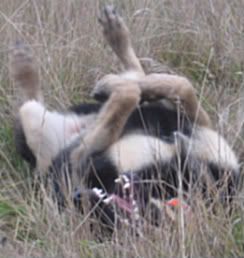
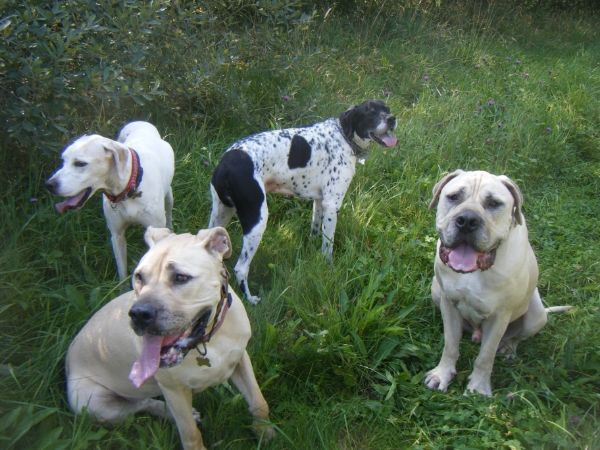
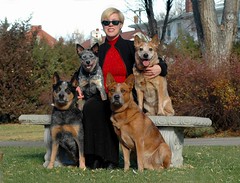

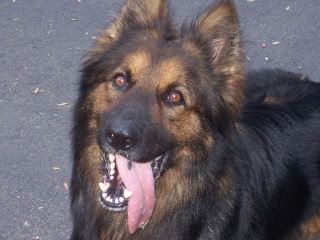
 BOGIE Aussie/Heeler Cross
BOGIE Aussie/Heeler Cross